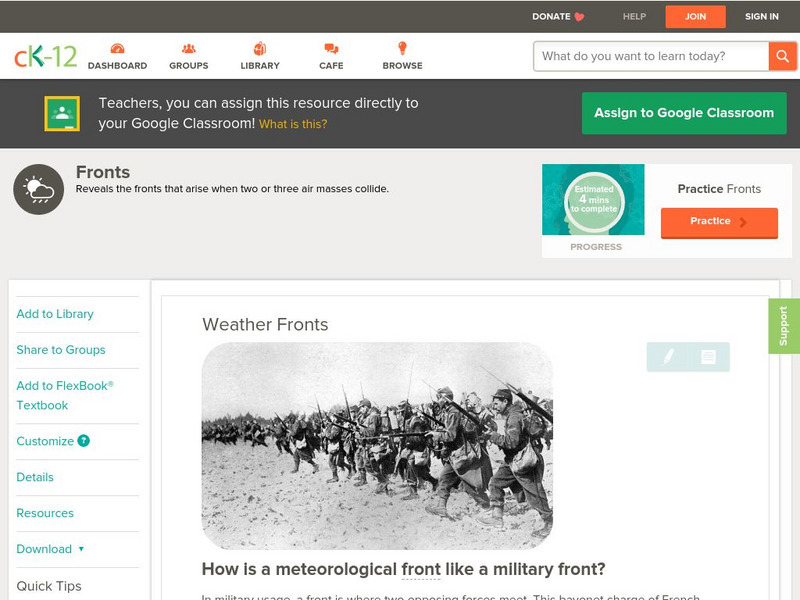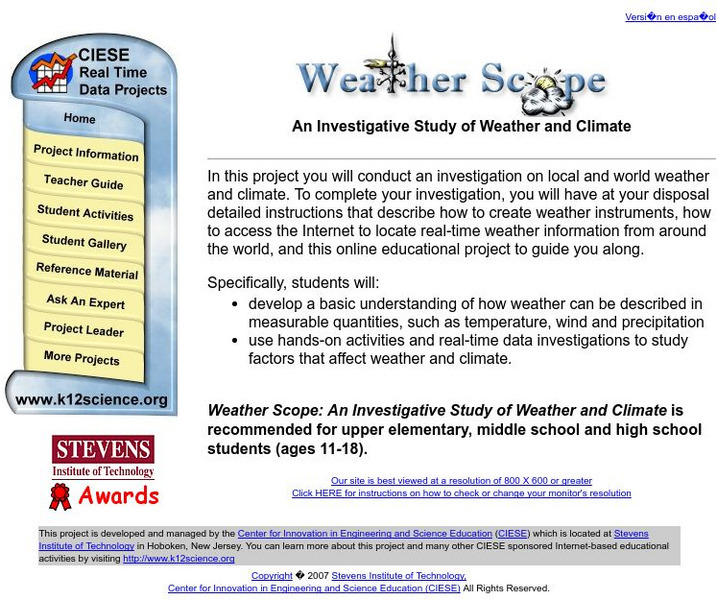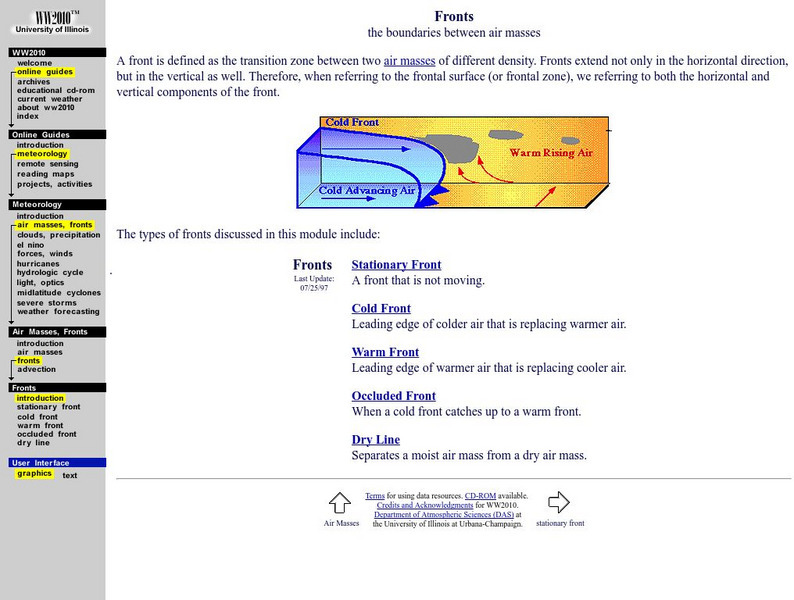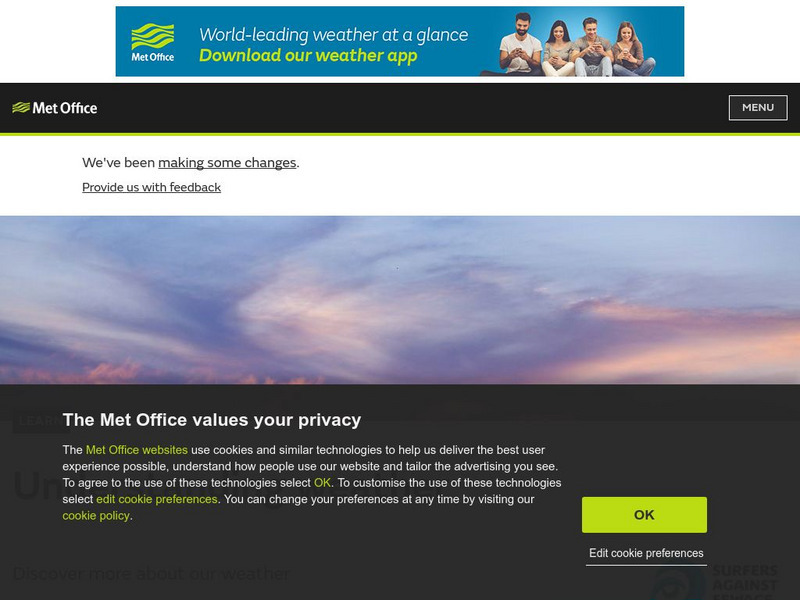Curated OER
Warm and Cold Front Foldable
For this warm and cold front worksheet, students fill in a Venn diagram relating cold and warm fronts, they read and observe pictures of cold and warm fronts and they answer questions about warm and cold fronts.
Curated OER
This Week's Weather
In this weather worksheet, students fill out a weather map each day of the week and give the lows, the highs, the warm fronts and the cold fronts. They answer six questions from their weather map work.
Curated OER
Cold Front Characteristics
Students study weather characteristics of a cold front passage. They view animations of several atmospheric variables (e.g., temperature, rainfall) during a cold front passage and locate the front, determine its direction of movement,...
Curated OER
Isotherms and Fronts
In this weather worksheet, students draw in isotherms on a temperature map. Students indicate the location of cold fronts, warm fronts, and stationary fronts. This worksheet has 2 drawing questions.
Curated OER
Weather
In this weather worksheet, students write the letter of the definition that best matches the term or phrase. Students answer several short answer questions as it relates to the components of weather, severe weather, and air masses....
Curated OER
Weather Patterns
In this weather worksheet, students identify with the symbols found on a weather map that show the locations of fronts, high- and low-pressure areas, and various types of precipitation across the United States. Then they use the map...
Curated OER
Dryline Characteristics
Learners view animations of several atmospheric variables (e.g., temperature, rainfall) during a cold front passage and locate the dryline, determine its direction of movement, and list at least two weather conditions associated with the...
Curated OER
Fronts
Fourth graders define cold and warm fronts, explain how they are formed and they ways that they affect the weather.
Curated OER
Fronts
In this fronts worksheet, students use two diagrams to answer 12 fill in the blank questions about fronts, weather patterns, and clouds. Then students complete 2 short answer questions.
Curated OER
Weather Patterns
In this weather worksheet, students define an air mass and describe the different types of weather fronts. Students compare and contrast high pressure and low pressure systems. This worksheet has 4 short answer questions.
Curated OER
Careers and Weather
Learners explore how weather affects a variety of jobs. Through a series of activity sheets, they determine what occupations create more or less activity because of weather conditions.
USA Today
Usa Today Weather: Understanding Storms and Fronts
Discusses air pressure, fronts, and storm formation. Links on page to well-illustrated and animated additional information.
University of Illinois
University of Illinois Extension: Ww2010: The Boundaries Between Air Masses
Describes the different types of fronts and the dry line associated with certain fronts. Well illustrated with diagrams and maps.
Oklahoma Mesonet
University of Oklahoma: Weather Fronts
The University of Oklahoma explores what fronts are, as well as the different types of fronts: cold front, warm front, stationary front, and occluded front.
CK-12 Foundation
Ck 12: Earth Science: Weather Fronts
[Free Registration/Login may be required to access all resource tools.] Describes the weather fronts that occur when two air masses collide. Includes downloadable handouts.
Center for Innovation in Engineering and Science Education, Stevens Institute of Technology
Ciese Real Time Data Projects: Weather Scope: A Study of Weather and Climate
Use real-time data to study factors that affect weather and climate, create weather instruments, and share data with students around the world.
University of Illinois
University of Illinois Urbana Champaign: Fronts
With the study of weather we need to know that there is air mass like fronts that change weather. This site shows us the different kinds of fronts that we experience.
Scholastic
Scholastic: Study Jams! Science: Weather & Climate: Air Masses & Fronts
A video and a short multiple-choice quiz on the topic of air masses and fronts. It describes the types of weather fronts, what an air mass is, and the four types of air masses in the US.
E-learning for Kids
E Learning for Kids: Science: Antarctica Research Center: Describe Different Weather Patterns
This module provides informational text about weather. Students will learn about precipitation and storm fronts. Students will also learn about different types of storms, including the following: hurricanes, cyclones, and typhoons.
University Corporation for Atmospheric Research
Ucar: Make a Weather Forecast
Review these tips and learn to make predictions of the weather.
CK-12 Foundation
Ck 12: Earth Science: Weather Fronts
[Free Registration/Login may be required to access all resource tools.] Describes the fronts that occur when two air masses collide.
Discovery Education
Discovery Education: Weather Maps
This site provides a lesson plan in which groups of students will each investigate a different type of weather map use for weather forecasting. Also includes discussion questions, extension ideas, and links to additional sites for more...
University Corporation for Atmospheric Research
Ucar: Weather Fronts
When a front passes over an area, it means a change in the weather. Many fronts cause weather events such as rain, thunderstorms, gusty winds and tornadoes.
























